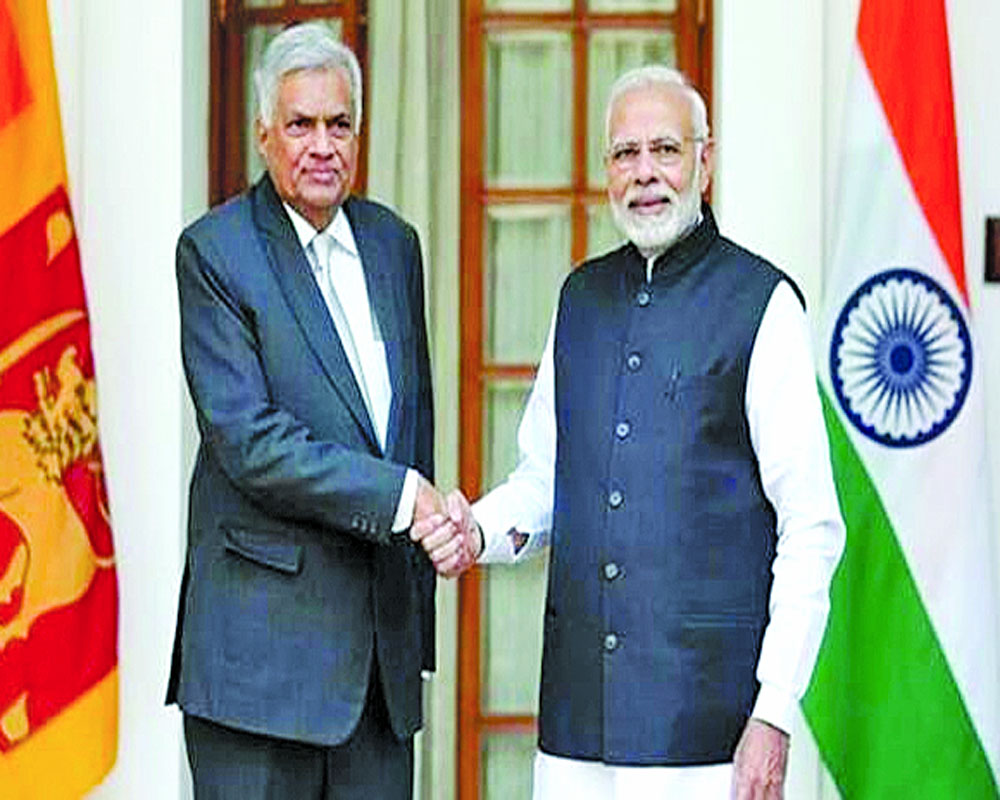What looked like near impossibility in not too distant past is now a reality. Sri Lanka has repulsed the allure of China and is back in India’s fold
Who could have dreamt that Sri Lanka where anti-India sentiment was sky-high and China (and Pakistan) ruled the roost, would come into India’s fold? Who could have thought that Sri Lanka, a country that was once touted to become the Singapore of South Asia, would default on its sovereign debt? Who could have imagined that the Rajapaksa clan which handled 70 per cent of the country’s wealth, were hailed as the victors of the 30-year-long war and were darlings of the south would be hounded out? Who could have conceived that six times Prime Minister Ranil Wickremesinghe whose United National Party (UNP) won one (that too on PR) seat, would become President? In 2022 many unthinkable happened in Sri Lanka.
Twice President, Mahinda Rajapaksa, younger brother and last President, Gotabhaya Rajapaksa, and party strategist and former finance minister Basil Rajapaksa, were all forced into hiding even as Gota fled the country while Basil was prevented from doing so. On 9 May 2022, Mahinda resigned following countrywide violence in which 9 persons died and 30 were wounded. Gota resigned on 15 July and Wickremesinghe was sworn in as acting President. On 20 March 2023, IMF approved USD 3 bn bailout and released USD330 mn as immediate disbursement. All three Rajapaksas along with former Governor Central Bank, Ajit Cabraal and former Finance Minister SR Attygalle have been charged by Transparency International Sr Lanka for being directly responsible for the economic crisis. Former President Chandrika Kumaratunga said the Rajapaksas and friends thought they owned the country and its assets. But Mahinda blamed foreign forces and the former government for the economic collapse.
The Rajapaksas were ousted from power by a popular people’s revolution, Aragalya, for their role in the economic meltdown. The economy slumped minus 11 per cent in 2022 and will decline minus 4 per cent in 2023. The shortage of foreign currency was made up mainly by India (USD4bn) in three months in 2022. As inflation rose to 99 per cent, and then fell to 59 per cent, nearly 30 per cent of the population is facing food insecurity and acute shortage of cooking gas, fuel and 10 to 12 hours power outages. Things have improved after creditors, especially India, helped. Wickremesinghe, who is also Finance Minister, presented the interim and full budgets last August and November.
He is still unpopular because contrary to Aragalya's demand, he has refused to dissolve Parliament whose term ends after two and a half years. He is backed by the Rajapaksas SLPP breakaway faction which has a majority in Parliament.
Wickremesinghe has postponed elections to 340 local bodies, due 9 March, indefinitely, SLPP fearing it will lose them and undermine their image. Rs 10 bn allotted for elections was ordered instead to be utilised to distribute free rice but the Supreme Court blocked the populist scheme. Provincial elections have not been held for four years. 12 members of SLPP including the mercurial GL Peiris, have joined the opposition SJB party as a breakaway faction of UNP. Another Aragalya has been threatened but Wickremesinghe has vowed to use the Army.
Meanwhile, Colombo suffered its worst defeat since 2009 at UNHRC Geneva during the 51/1 Resolution last October. Most of the demands were carryovers from previous resolutions. For the first time, India included issues of reconciliation and devolution calling actions taken on them by Sri Lanka inadequate and abstained from voting for the resolution. This prompted Wickremesinghe to resume dialogue with the Tamil National Alliance and pledged to implement fully, the 13th Amendment enacted in 1987.
The India-China rivalry took a distinct pro-China trajectory in 2005 as India refused to provide lethal arms while China (and Pakistan) were obliging. Further, the Rajapaksas are so deeply indebted to China for the massive and superfluous infrastructure projects in the south, especially the airport and Hambantota sea port which is on a 99-year lease to Beijing. Similarly, Colombo Port City is expected to become another white elephant. With the elimination of the Rajapaksas China, the third biggest creditor after Japan and ADB has changed its tune, dragging its feet over debt restructuring.
The Chinese naval surveillance ship Yuan Wang5 was first prevented from docking at Hambantota port after India raised strong objections but later, it managed to force its entry.
Besides the cancellation of income tax concessions, IMF imposed conditions for the 17th bailout including the reduction of the once worshipped Army from its strength of 200,000 to 135,000 by 2024 and 100, 000 by 2030. This could never have happened during Colonel Gotabhaya’s presidency. Several officers including three Generals including present CDS, Lt Gen Shavindra Silva, have been sanctioned by the UN and separately by the US with travel bans. Sri Lankans have recognised India’s timely USD 4bn assistance and first responder in debt restructuring. Foreign Minister S Jaishankar said on his recent visit to Colombo that India will stand by the people of Sri Lanka at all times. India’s primacy in Sri Lanka is likely to continue as Wickremesinghe has cancelled Chinese energy projects in Jaffna and finally allotted oil tanks in Trincomalee for refurbishment. Sri Lanka is becoming India’s foreign policy triumph.
(The writer, a retired Major General, was Commander, IPKF South, Sri Lanka, and founder member of the Defence Planning Staff, currently the Integrated Defence Staff. The views expressed are personal)




















